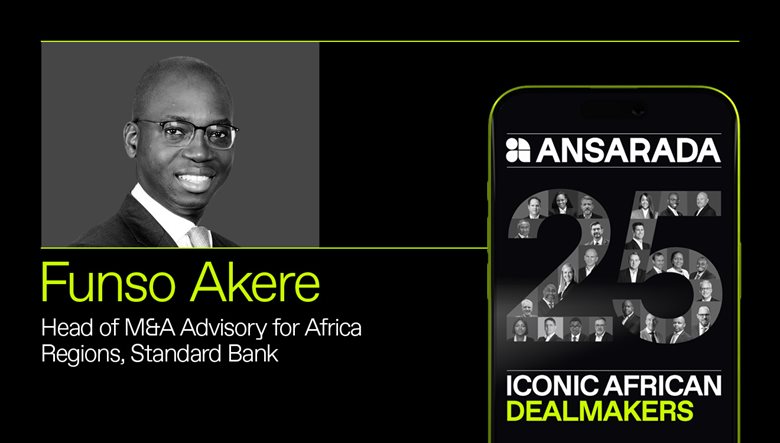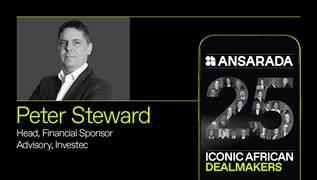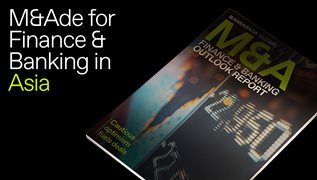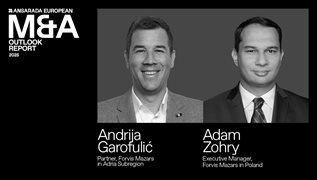Standard Bank's Funso Akere on divestment by multinationals and financial sponsors
With over 24 years of investment banking experience across sub-Saharan Africa, Funso has been a key figure in shaping the corporate finance and M&A landscape in the region.
By AnsaradaFri Jul 25 2025Mergers and acquisitions, Industry news and trends, Innovation

As the Head of M&A Advisory for Africa Regions at Standard Bank, he brings deep expertise in deal structuring, across sectorsin key African markets. Prior to this, Funso served as the Chief Executive of Stanbic IBTC Capital, Standard Bank Group’s Nigerian investment banking arm, where he oversaw major M&A, capital markets and financing transactions across sectors.
Beyond his work in dealmaking, Funso has made significant contributions to corporate governance in Nigeria, notably serving as Secretary of the Committee on Corporate Governance, which published the country’s f irst Code of Best Practices for Public Companies in 2003.
In this exclusive Q&A, Funso reflects on his journey in investment banking, the evolution of M&A in Africa, and the trends set to define the next decade of dealmaking.
What initially inspired you to pursue a career in corporate finance and investment banking?
My interest in investment banking and corporate finance began in university, where I enjoyed tackling complex problems. I recall working on a paper on revenue allocation in Nigeria—researching, gathering data, and developing solutions. That problem-solving mindset naturally aligned with corporate finance and M&A, which involve addressing multifaceted challenges to deliver impactful outcomes for clients for clients.
With over 24 years in investment banking, you’re approaching a major milestone. How has your journey unfolded?
It’s fitting that Dealmakers is celebrating 25 years, as I’ll also mark 25 years with Standard Bank Group on February 2nd. I started my career in the corporate f inance team in Nigeria and I was immediately immersed in the world of M&A and priacte and public capital raising. It’s been an incredible journey f illed with transformative transactions which have driven growth across Africa.
That’s an impressive tenure. How has your passion for the industry evolved over the years?
I’ve been fortunate to work on transformative deals. For instance, in 2000, Nigeria was focused on privatization. We advised SCANCEM (part of the Heidelberg Group) on acquiring Cement Company of Northern Nigeria and later on acquiring the assets of Bendel Cement Company. Witnessing how two struggling companies evolved into a thriving multi-billion-dollar business under BUA Group’s ownership— creating jobs and positively impacting communities—has been incredibly fulfilling. It’s this ability to drive tangible change through M&A that keeps me motivated.
What have been the most significant changes driving deal‑making activity in Nigeria’s capital markets over the past 25 years?
In the early 2000s, privatization was a major driver, with the government transferring ownership of struggling companies to the private sector. This era saw landmark deals, including the privatization of Matind Oil and Chemical Marketing Company (now Conoil) and several cement companies. We also handled notable M&A deals, including the merger of ELF Oil Nigeria and Total Nigeria, United Nigeria Facility and Nichemter, and Unipetrol Nigeria and Agip Nigeria, which led to the creation of Oando PLC in 2003. From 2004, the banking recapitalization exercise took center stage, requiring banks to increase their capital base from $20 million to $200 million.
We facilitated IPOs and follow-on offerings for Standard Trust Bank (now UBA), Zenith Bank, Access Bank, GTBank, and Diamond Bank, as well as Dangote Sugar, raising substantial funds and attracting foreign investors. Between 2010 and 2014, cross-border M&A surged, fueled by Nigeria’s strong GDP growth and expanding middle class. Deals like Famous Brands acquiring UAC Restaurants and Tiger Brands acquiring Dangote Flour Mills exemplify this golden era of cross-border activity. Nigeria rebased its GDP in 2014, becoming Africa’s largest economy.
Did the oil price crash that followed impact deal-making? Yes, it was a mix of unavoidable and avoidable factors. When I returned to Nigeria in March 2015, there was optimism for economic reforms under the new administration. However, the oil price crash, coupled with capital controls, led to FX shortages and created significant market volatility.
By 2017, the government introduced a new FX policy, which stabilized the exchange rate and returned the economy to the path of growth. We faced a similar problem in 2020, which lingered on until last year. Investor frustration with inconsistent policies has dampened deal activity.
How are President Bola Tinubu’s reforms, such as exchange rate unification, affecting Nigeria’s M&A market today?
The economic challenges President Tinubu’s administration inherited in 2023 were significant, requiring bold reforms such as fuel subsidy removal, exchange rate unification, and electricity tariff increases. While these measures have caused shortterm pain, including inflation and a higher cost of living, they are necessary to move the economy forward.
The focus now should be on leveraging savings from these reforms to invest in viable infrastructure projects with a significant multiplier effect, which will create a more favorable environment for M&A.
Looking ahead, which sectors do you see driving M&A activity in Nigeria over the next decade?
Oil and gas will be a key driver, with indigenous companies acquiring assets from international oil companies and pursuing vertical integration in the gas value chain. In the FI sector, we expect bank recapitalizations to drive capital raises and consolidation among players.
Divestment by multinationals and financial sponsors should drive M&A activity in the consumer sector, while fintech expansion and digital infrastructure investments will continue to fuel M&A activity in the TMT sector. A recent example is MoneyPoint achieving unicorn status, highlighting the immense potential in Nigeria’s tech ecosystem.
Reflecting on your career, is there a transaction that stands out as career‑defining?
Several transactions hold special significance. These include the Dangote Sugar IPO in 2003, which raised $450 million, attracted a large number of international investors to Nigeria. A series of transactions for Presco Plc over two decades, cutting across equity and debt issuances, financing, and M&A, is another highlight.
More recently, Tolaram’s acquisition of Diageo’s majority stake in Guinness Nigeria represents a transformational deal that will shape the consumer sector in Nigeria for years to come.
What personal philosophy or core value has shaped your success in investment banking?
Client-centricity has been my guiding principle—putting the client’s interests first ensures mutual success and enduring long-term relationships. If I could offer advice to my younger self, it would be to adopt a “nothing is impossible” mindset in everything I do. Take things step by step, prepare thoroughly, and remain persistent. Opportunities often arise when you’re well-prepared and focused on your goal.


